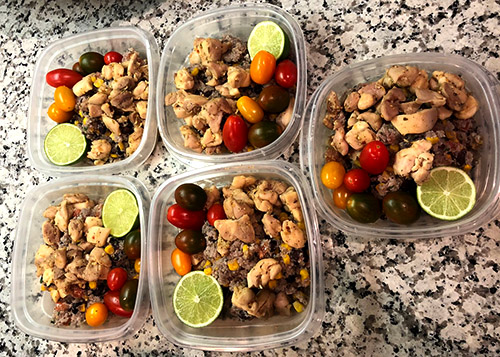Every year, we celebrate National Nutrition Month in March to help focus attention on sound eating and physical activity habits as well as making informed food choices as a consumer. Rather than talk about what we should be eating again this year, the campaign is focusing on an often overlooked part of consumption–food waste. We want you to “go further with your food.” Every year, some 60 million tons of produce are wasted annually in the US, which equates to roughly 160 billion dollars wasted! Imagine, over time the impact this has on our costs. Not only does it affect us as consumers, it also impacts food producers, those that are food insecure, and our environment. This month, I want to focus on some ways that you can reduce your waste in your home to help the greater good.
Meal Planning
Not only can this help your budget and your schedule, but it helps you structure a grocery list so that you only buy what you need at the store and don’t overbuy food that will end up being wasted because it goes unconsumed. When you are deciding your weekly menu, check your fridge and pantry and plan the beginning of the week based on what needs to be used first. If you don’t know what to do with a certain food item, hop onto google for inspiration.
Prevent Spoilage
Only buy at the store what can be used or frozen within a few days. If you have fresh produce that spoils quickly, put it in sight, so you are more likely to use it. Learn what fruits and vegetables need to be stored in the refrigerator, and which shouldn’t, as this can affect how they keep. A good resource can be found here: https://www.thekitchn.com/the-kitchns-guide-to-storing-fruits-and-vegetables-tip-roundup-176308
Get creative with leftovers
A lot of leftovers can be transformed into a new meal over a couple of days, so you don’t get bored of the same thing. For instance, you can take a roasted chicken and turn it into soup, salads, enchiladas, or even throw into a pasta with a light sauce.
Practice proper portions
Try to only eat what you know you need. At a restaurant, split an entree or get a to go box from the beginning, so you have another meal to take home with you.
Look into other alternatives
If you clean out your pantry and you have things you won’t use, and they are still good, consider donating to a food pantry in your area. If you have fresh items that can no longer be eaten, at least try to compost to help the earth and return nutrients to it.
Remember, food safety is first, so never eat something you are unsure of (or leftovers more than 4 days old), but do use the tips above so you spend less time guessing and less money filling your trash can.
Have a healthy month!
